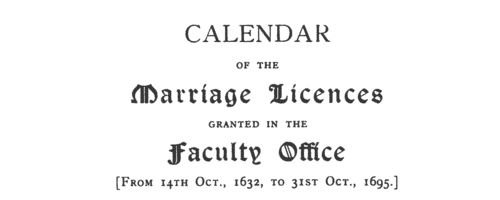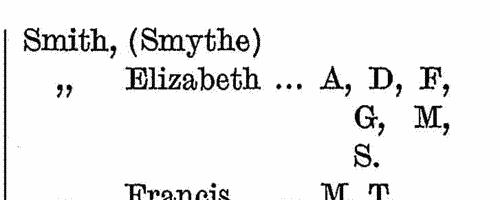Wranch Surname Ancestry ResultsOur indexes 1000-1999 include entries for the spelling 'wranch'. In the period you have requested, we have the following 5 records (displaying 1 to 5): Buy all | | | Get all 5 records to view, to save and print for £28.00 |
These sample scans are from the original record. You will get scans of the full pages or articles where the surname you searched for has been found. Your web browser may prevent the sample windows from opening; in this case please change your browser settings to allow pop-up windows from this site. Testators and legatees in London
(1258-1358)
The mediaeval Court of Husting of the city of London sat (usually on a Monday) each week: among its functions was the enrolment of deeds and wills relating to citizens of London. In their strictest technical sense the terms 'will' and 'devise' are appropriate to real estate, and the terms 'testament', 'bequest' and 'legacy' to personal estate, but this distinction is lost sight of in ordinary usage. This calendar of wills proved and enrolled in the Court of Husting was edited by Reginald R. Sharpe, records clerk in the office of the Town Clerk of the City of London, and printed by order of the corporation in 1889. The date of the court is given in italics, with the year in bold in the margin. The testator's name is given in capitals (surname first, in bold), and then a brief listing of substantial bequests, with the names of legatees, and then the date of making of the will, and reference. Sometimes there were further proceedings in the court relating to the will, such as 'It was found by a jury that the testator was of full age when he made the above testament', a statement as to where the testament had been proved, or proceedings on a challenge to the testament &c. - such additional material is added in a smaller typeface in this edition.WRANCH. Cost: £4.00.  | Sample scan, click to enlarge

| Licences for marriages in southern England
(1632-1714)
The province or archbishopric of Canterbury covered all England and Wales except for the northern counties in the four dioceses of the archbishopric of York (York, Durham, Chester and Carlisle). Marriage licences were generally issued by the local dioceses, but above them was the jurisdiction of the archbishop. Where the prospective bride and groom were from different dioceses it would be expected that they obtain a licence from the archbishop; in practice, the archbishop residing at Lambeth, and the actual offices of the province being in London, which was itself split into myriad ecclesiastical jurisdictions, and spilled into adjoining dioceses, this facility was particularly resorted to by couples from London and the home counties, although there are quite a few entries referring to parties from further afield. Three calendars of licences issued by the Faculty Office of the archbishop were edited by George A Cokayne (Clarenceux King of Arms) and Edward Alexander Fry and printed as part of the Index Library by the British Record Society Ltd in 1905. The first calendar is from 14 October 1632 to 31 October 1695 (pp. 1 to 132); the second calendar (awkwardly called Calendar No. 1) runs from November 1695 to December 1706 (132-225); the third (Calendar No. 2) from January 1707 to December 1721, but was transcribed only to the death of queen Anne, 1 August 1714. The calendars give only the dates and the full names of both parties. Where the corresponding marriage allegations had been printed in abstract by colonel Joseph Lemuel Chester in volume xxiv of the Harleian Society (1886), an asterisk is put by the entry in this publication. The licences indicated an intention to marry, but not all licences resulted in a wedding. WRANCH. Cost: £4.00.  | Sample scan, click to enlarge

|  Masters and Apprentices
(1720) Masters and Apprentices
(1720)
Apprenticeship indentures and clerks' articles were subject to a 6d or 12d per pound stamp duty: the registers of the payments usually give the master's trade, address, and occupation, and the apprentice's father's name and address, as well as details of the date and length of the apprenticeship. 1 January to 3 September 1720.WRANCH. Cost: £8.00.  | Sample scan, click to enlarge

| Inhabitants of Hertfordshire
(1723)
An Act of Parliament of 9 George I required all men aged 18 and over who had not done so previously to swear allegiance. From 17 August to 24 December 1723 the greater part of the men of Hertfordshire attended at various inns in the county to sign the oath of allegiance: women were exempt from the act, but almost as many attended and swore. This list indicates the place of attestation by letters A., B., C., &c., for which there is a key, scans of which are included with the main scan for the surname. WRANCH. Cost: £4.00.  | Sample scan, click to enlarge

|  Masters of apprentices
(1755) Masters of apprentices
(1755)
Apprenticeship indentures and clerks' articles were subject to a 6d or 12d per pound stamp duty: the registers of the payments usually give the master's trade, address, and occupation, and the apprentice's name, as well as details of the date and length of the apprenticeship. 1 January to 31 December 1755.WRANCH. Cost: £8.00.  | Sample scan, click to enlarge

|
Research your ancestry, family history, genealogy and one-name study by direct access to original records and archives indexed by surname.
|








